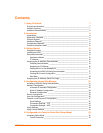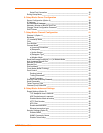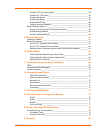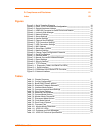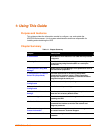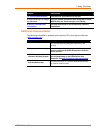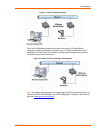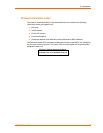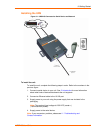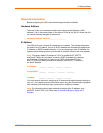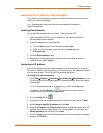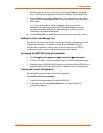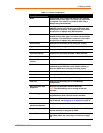
2: Introduction
UDS2100 User Guide 11
Protocol Support
The UDS uses the Internet Protocol (IP) for network communications and the
Transmission Control Protocol (TCP) to assure that no data is lost or duplicated and
that everything sent to the connection arrives correctly at the target.
Supported protocols include:
ARP, UDP, TCP, ICMP, Telnet, TFTP, AutoIP, DHCP, HTTP, and SNMP for
network communications.
TCP, UDP, and Telnet for connections to the serial port.
TFTP for firmware updates.
IP for addressing, routing, and data block handling over the network.
User Datagram Protocol (UDP) for typical datagram applications in which
devices interact with other devices without a point-to-point connection.
Additional Features
Modem Emulation: In modem emulation mode, the UDS can replace dial-up
modems. The unit accepts modem AT commands on the serial port and then
establishes a network connection to the end device. This arrangement leverages
network connections and bandwidth to eliminate dedicated modems and phone lines.
Built-in Web Server: The UDS includes a built-in web server for configuring the unit
and displaying operating and troubleshooting information on the attached links to
online support.
Configuration Methods
After installation, the UDS requires configuration. For the unit to operate correctly on
a network, it must have a unique IP address on the network. There are three basic
methods for logging into the UDS and assigning IP addresses and other configurable
settings:
DeviceInstaller: Configure the IP address and other network settings on the UDS
using a Graphical User Interface (GUI) on a PC attached to a network.
(See Assigning the IP Address: DeviceInstaller on page 16.)
Web Manager: Through a web browser, configure the UDS settings using the
Lantronix Web Manager. (See 4: Configuration Using Web Manager.)
Serial and Telnet Ports: Use Setup Mode, a command line interface. There are two
approaches to accessing Setup Mode: making a Telnet connection to the network
port (9999) or connecting a terminal (or a PC running a terminal emulation program)
to the unit’s serial port. (See 5: Configuration via Telnet or Serial Port (Setup Mode).)



